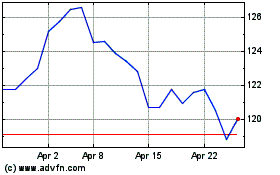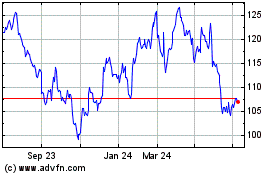Volkswagen Asks Supreme Court to Block Local Emissions Regulations
January 26 2021 - 4:25PM
Dow Jones News
By Sara Randazzo
German auto giant Volkswagen AG is asking the U.S. Supreme Court
to overturn a ruling that it says opens up car makers to a flood of
emissions regulations from local governments that could clash with
existing federal rules.
The request to the high court, filed last week and made public
Tuesday, is the latest turn in litigation that has dogged
Volkswagen since it admitted in 2015 to rigging 11 million diesel
vehicles world-wide with software that allowed them to evade
government emissions tests. The company has paid more than $30
billion in fines and settlements because of the scandal, including
some $23 billion in the U.S.
At issue is a June decision by the Ninth U.S. Circuit Court of
Appeals that ruled two counties have authority alongside the
federal Environmental Protection Agency to regulate the updates
that car manufacturers make to emissions systems in vehicles after
they are sold. Florida's Hillsborough County and Salt Lake County
in Colorado are seeking daily penalties of $5,000 per rigged diesel
car for the local pollution they caused, with potential yearly
damages of $11.2 billion.
Volkswagen argues it shouldn't have to pay those fines because
the court decision misinterprets the federal Clean Air Act, which
it says gives sole regulatory authority over manufacturer changes
to car emissions to the EPA and California. The company argues that
the EPA approved a software update Volkswagen made to the cars
before the diesel-emissions scandal broke, and that its move isn't
akin to something a county could regulate, such as a local mechanic
tampering with emissions.
To date, the company has entered into $23 billion worth of civil
and criminal settlements with federal and state regulators and
drivers of nearly 600,000 U.S. diesel vehicles. Those agreements
didn't prevent some states and local governments from separately
suing Volkswagen, lawsuits the company has won in Alabama,
Tennessee and Minnesota.
"The Ninth Circuit's decision conflicts with the rulings of
multiple courts and will severely compromise the EPA's ability to
regulate auto emissions," a company spokesman said Tuesday. The
company made similar arguments this week in a separate case in
front of the Ohio Supreme Court over that state's regulatory
power.
If the Ninth Circuit ruling stands, "manufacturers will know
that settling with EPA could trigger copycat state and local
government actions," Volkswagen wrote in its Supreme Court
petition.
The California-based Ninth Circuit acknowledged in last year's
ruling that its conclusion "may result in the imposition of
unexpected (and enormous) liability on Volkswagen" and prevent the
EPA from controlling the total liability imposed on auto makers for
any emissions tampering violations. But the judges concluded
Congress didn't intend for the Clean Air Act to prohibit counties
and states from having enforcement power in this context.
The Ninth Circuit upheld part of a lower court's ruling in favor
of Volkswagen, finding the Clean Air Act prevents local governments
from regulating new cars.
The counties have argued in court filings that air pollution is
a local problem that warrants local enforcement in addition to the
federal regulations. Attorneys for Salt Lake and Hillsborough
counties said Tuesday they don't expect the Supreme Court to take
up the appeal. Volkswagen's diesel cars "caused exponential harm to
the Tampa area" and the county should be able to protect its local
environment, Hillsborough County attorney Dee Miles said.
Other auto makers have watched the dispute closely. "[T]he
decision has created regulatory chaos," two car maker trade
organizations and the U.S. Chamber of Commerce wrote in a brief in
support of Volkswagen last August. If EPA alone can't be relied on,
the groups wrote, "The effect would be to discourage all post-sale
changes, including those that benefit consumers and the
environment."
Since the Ninth Circuit decision came out, Hillsborough County,
represented by private plaintiffs' lawyers, has sued Mercedes-Benz
owner Daimler AG over similar diesel-emissions issues. The county's
Environmental Protection Commission is contemplating lawsuits
against other car makers, according to a September public-meeting
agenda. A Daimler spokesman said the claims have no merit.
The EPA and Justice Department under former President Donald
Trump declined to participate in the Volkswagen case when invited
to by the Ninth Circuit. President Biden's administration could
have the opportunity to weigh in if asked by the Supreme Court,
which has the discretion to take up or deny Volkswagen's request
for an appeal.
Volkswagen has been working to move on from its emissions
scandal, including by making a huge push into electric vehicles.
Several former executives might still face a trial in Germany on
charges of defrauding customers. Last fall the company wrapped up a
three-year compliance monitoring program required by U.S.
regulators.
Write to Sara Randazzo at sara.randazzo@wsj.com
(END) Dow Jones Newswires
January 26, 2021 16:10 ET (21:10 GMT)
Copyright (c) 2021 Dow Jones & Company, Inc.
Volkswagen (TG:VOW3)
Historical Stock Chart
From Mar 2024 to Apr 2024

Volkswagen (TG:VOW3)
Historical Stock Chart
From Apr 2023 to Apr 2024
